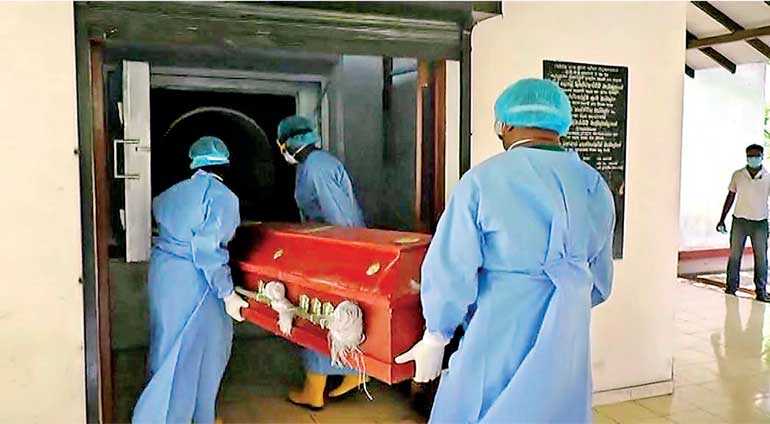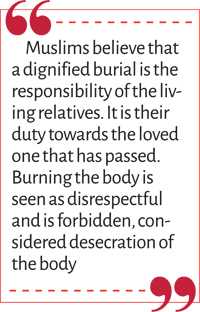Monday Feb 16, 2026
Monday Feb 16, 2026
Saturday, 2 January 2021 00:00 - - {{hitsCtrl.values.hits}}

Health officials in the country have taken steps to forbid the burial of bodies of COVID-19 victims. This they say is to prevent the spread of the disease through the underground waterways. But they have not provided logical reasons for their actions, trustworthy information and reliable evidence
By Waruna Padmasiri
A dead body was being bathed with fresh milk, a second body wrapped in white cloth being carried on the shoulders of men in sarongs, multiple bodies burning atop custom-built wooden crematorium along the shores of the Ganges in Varanasi. Although this was just last year, I felt like I was in ancient India in time of Ashok.
As Buddhists we believe that death, like birth is simply a part of the life cycle. Similar to Buddhists, Hindus also believe in the temporary nature of the human form. The body is a vessel, without life it has no purpose. Once we die, we will be born again in another life, in a different form.
Regardless of the conviction in these beliefs one has, when someone we love passes away, we feel sadness, a sense of loss and emptiness. We perform so many rituals and customs to bless them, to give them merit and to remember them.
I remember when my uncle passed away last year. Days before his daughter, my cousin’s O-level exams, he left us forever, at a moment that we never expected to lose him. As the responsibilities of the living, we raised white flags, gave pansa koolaya, remembrance sermons, seven-day dana, three month and one-year daanaya, etc. I think the faith we have in our beliefs consoled us at a time of pain and grief. 
Recently I heard about the cremation of the body of a 20-day-old baby without the consent of the parents because the health authorities suspected the child to have had COVID 19. This became a hot topic on social media.
One particular comment on Facebook grabbed my attention: “How inhumane is it to burn a 20-day old baby?”
To my ignorant mind, the first thing that I thought was, “How could you compare the cremation of a dead body to burning a child alive?” However, my curiosity got the better of me. I wanted to understand why she thought this way.
According to Buddhist and Hindu beliefs, a body without life has no purpose. It was clear that a lot of Sri Lankans don’t feel the same way about a lifeless body. Why do Muslims care so much about burying their dead?
When I searched online, most of the results were about the current situation in Sri Lanka: ‘COVID 19 victims not allowed to be buried’. I felt it was difficult to find valid information on the topic. With the help of friends, I eventually unravelled the reason behind feelings towards cremation.
The major religions from the Abrahamic tradition, Catholic, Christian, Jewish and Islam, give a very important place to burying their dead. According to my understanding of these faiths, God created man in his image by moulding clay or the earth, so it is only natural they believe, once dead, we return the body to the earth by burying the dead.
Secondly, and like Buddhists and Hindus, Christians and Muslims too believe in a life after death. While we believe in reincarnation, those from the Abrahamic tradition believe in the ‘resurrection’ where God will bring back to life all those who have passed. Some believe that God will use a particular part of the human body to resurrect the dead.
Muslims believe that a dignified burial is the responsibility of the living relatives. It is their duty towards the loved one that has passed.
Fourth, burning the body is seen as disrespectful and is forbidden, considered desecration of the body. Some go as far as to say that a Muslim should never even take part in a cremation because it is sin.
Fifth, in Islam great emphasis is placed on treating the dead body with respect and to treat it the same as if the body had life, almost as if the body could still feel, even though it is not breathing.
I can now understand why a person that grew up with Islam might feel that burning of a lifeless body is similar to burning a person alive.
Regardless of my belief in heaven and hell, resurrection, and reincarnation, I feel that as a human being the feelings I should have towards a person that has just lost their child, mother, father, brother or sister, relative, or friend are feelings of sympathy and empathy.
Health officials in the country have taken steps to forbid the burial of bodies of COVID-19 victims. This they say is to prevent the spread of the disease through the underground waterways.
As a citizen all I can ask the officials who restrict my freedom is to provide logical reasons for their actions, trustworthy information and reliable evidence. A lot of people feel that this evidence base has not been provided by the authorities. When the evidence is not forthcoming, I can understand why people would feel frustrated and make assumptions about the intention behind these regulations.
If someone knowingly and intentionally acts to cause pain and suffering especially towards someone grieving, as a Buddhist I would see it as a sinful act one that would bring bad karma. I don’t personally know the intentions behind the officials responsible for the particular act. It’s in my nature to give anyone the benefit of the doubt. I sincerely hope they acted genuinely with pure intentions and put the minds of many Sri Lankans at rest by showing us the evidence.
As citizens we all have a responsibility to look at an issue both logically and humanely. If we can try a little harder to be kinder to each other, we could not only prevent harm, we might also resolve our differences a bit better.
When I read some of the comments on social media, I feel a lot of them, like I did, come from a place of not understanding the reason for differences of opinion of their fellow citizens, or the place where the ‘other’ is coming from.
When I read some other comments, I am reminded how my year 7 Buddhist teacher at Ananda College yelled at the class, “If there isn’t an ounce of kindness in your heart, you cannot be a Buddhist! Not even if you memorise the entire Thripitakaya!”